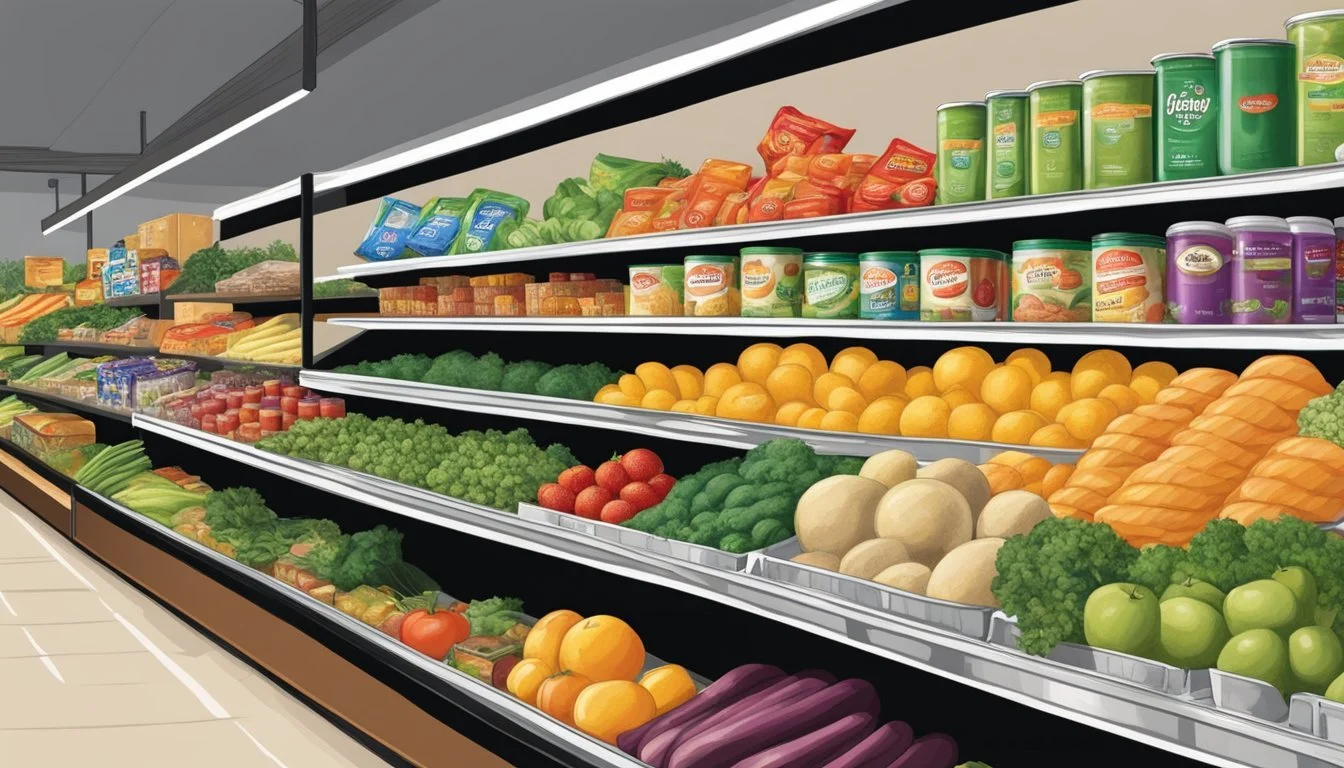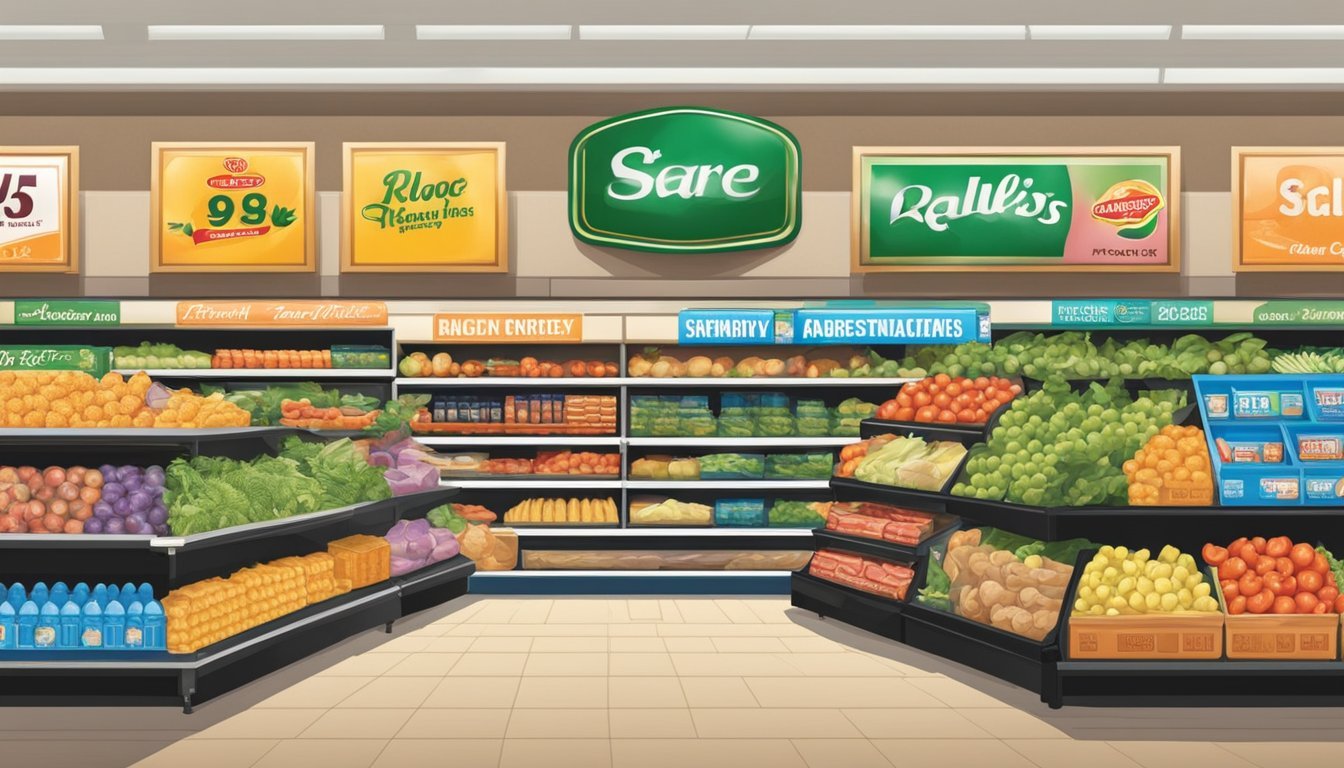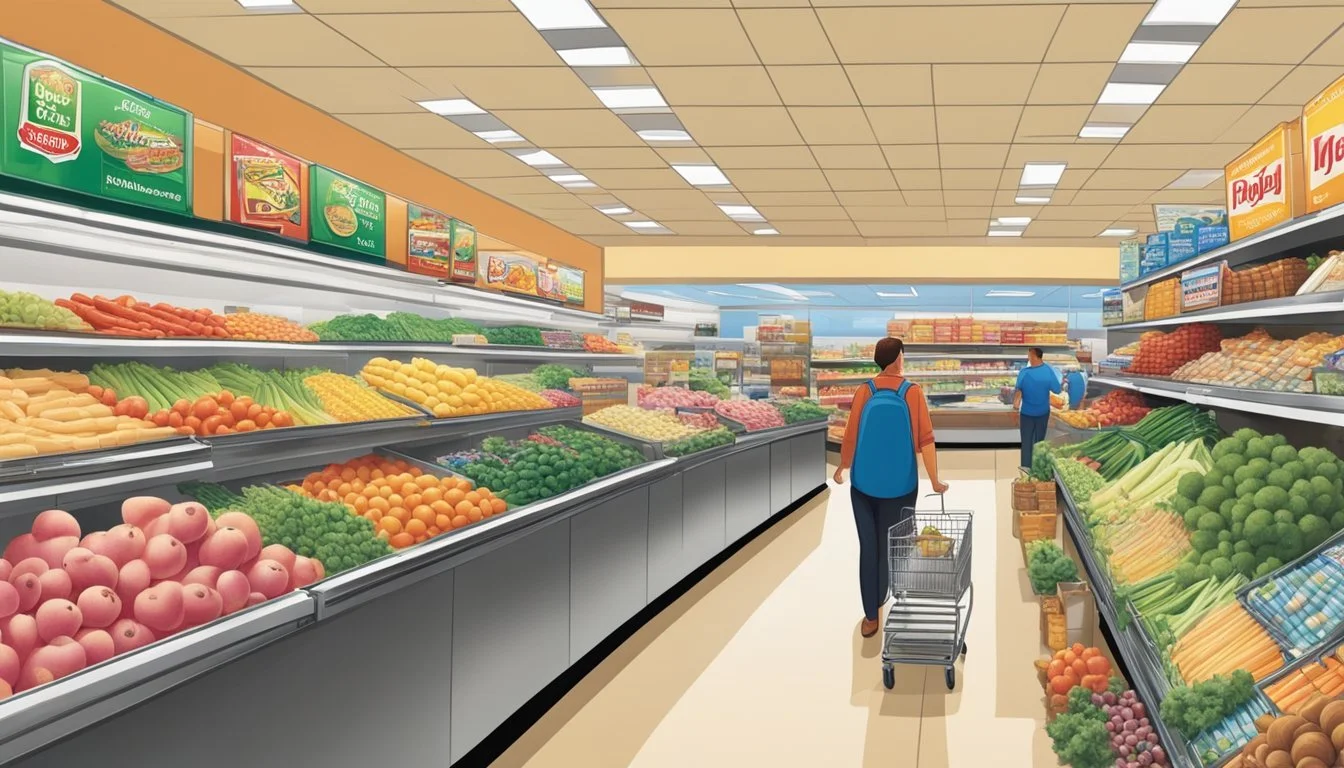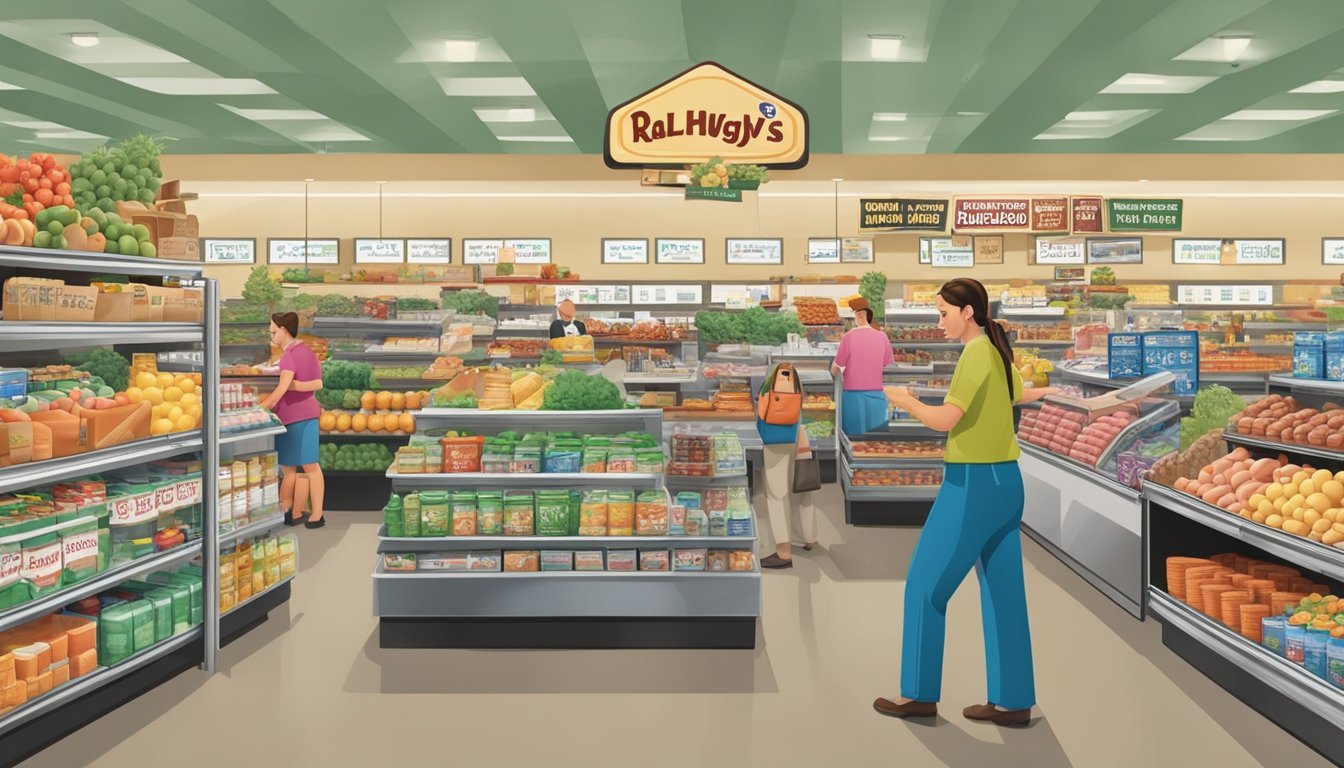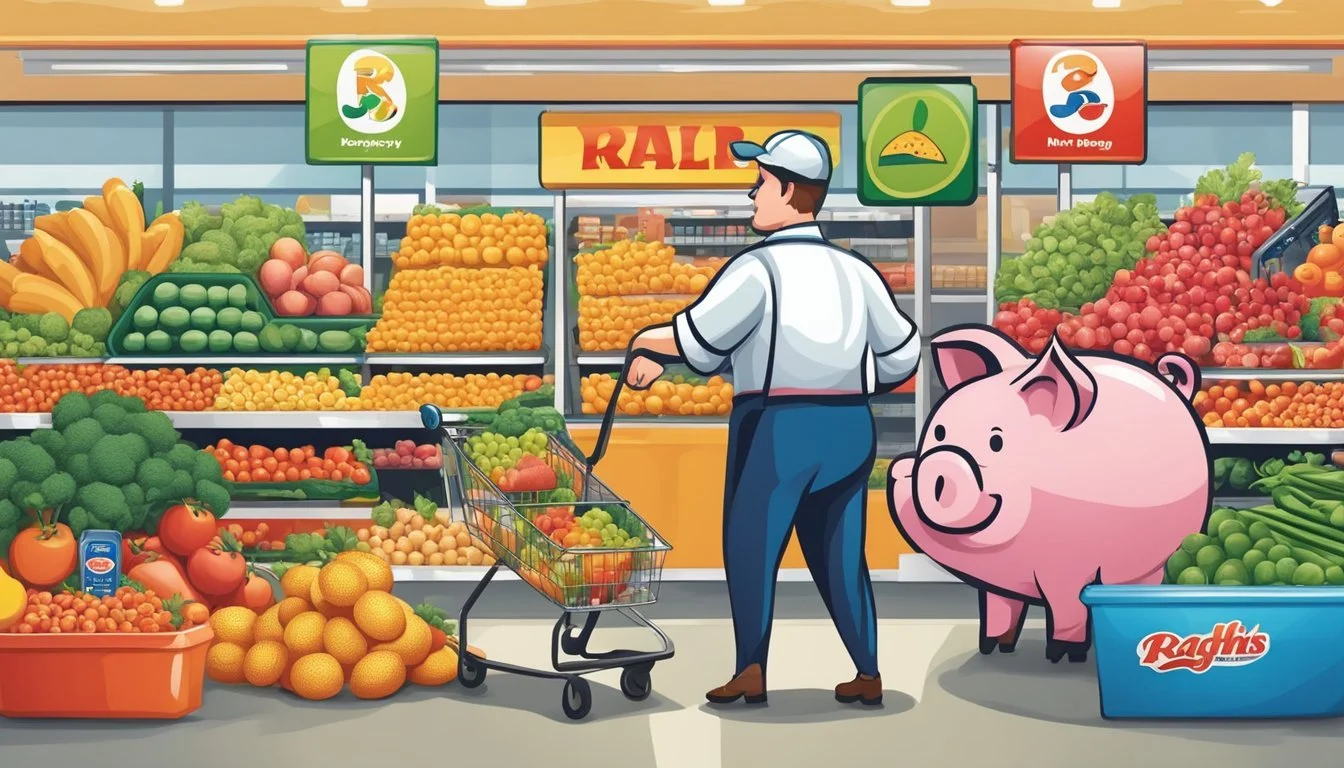Piggly Wiggly vs Ralphs
A Comparative Shopping Experience Analysis
Part of Our Grocery Store Guide with Details on Piggly Wiggly and Ralphs
When it comes to grocery shopping, the choice of store can significantly affect the quality of goods, variety of selections, and overall shopping experience. Piggly Wiggly and Ralphs are two prominent grocery chains that operate in different regions of the United States. Piggly Wiggly, with its deep Southern roots, enjoys a loyal customer base that appreciates its local charm and history as a grocery innovator. On the other hand, Ralphs, a mainstay in California, is known for its wide array of products and as a subsidiary of one of the nation's largest supermarket chains, Kroger.
Each store carries its own set of strengths. Piggly Wiggly prides itself on its customer-centric approach, often allowing local store managers to tailor selections to the community's preferences. Ralphs, being part of the larger Kroger family, benefits from economies of scale, offering competitive prices and a robust rewards program. Both grocery chains aim to provide convenience, but their strategies differ: Piggly Wiggly focuses on a neighborly feel with personalized service, while Ralphs emphasizes variety and modern amenities.
Assessing which grocery store is "better" may not be a straightforward answer as it largely depends on individual shopper priorities. Some might prioritize cost-effectiveness, while others may value a specialized local selection or store atmosphere. Such preferences would influence whether Piggly Wiggly or Ralphs would be the preferable grocery shopping destination.
History and Background
In evaluating Piggly Wiggly and Ralphs, the origins and development of these pioneering grocery stores reveal a fascinating aspect of supermarket history, with each playing important roles in the evolution of grocery shopping.
Piggly Wiggly's Origins
Piggly Wiggly claims its fame as the first self-service grocery store in the United States, founded by Clarence Saunders in 1916 in Memphis, Tennessee. This revolutionary concept allowed customers to (for the first time) gather their groceries without a clerk's assistance, changing shopping from a service-oriented experience to a customer-driven one. Its rapid expansion became a testament to its successful model.
Ralph's Development
Ralphs, a supermarket chain with its roots in Los Angeles, started in 1873 when George A. Ralphs opened the first store. It grew steadily, adapting to new market trends and consumer demands. Today, Ralphs is recognized as one of the oldest grocery chains west of the Mississippi River, with a strong Southern California presence.
Grocery Store Evolution
The transformation from local grocer stores to self-service supermarkets was a key step in the evolution of today's shopping experience. Both Piggly Wiggly and Ralphs were instrumental in moving away from the traditional service model to one where customers had more freedom and choice, exemplifying the shift towards modern supermarkets. This evolution is marked by a change in store layouts, shopping practices, and operational efficiencies that have set the standard for current grocery shopping norms.
Store Branding and Recognition
When examining Piggly Wiggly and Ralphs, their approaches to store branding and recognition reveal not just their market presence but also consumer preferences and perceptions influenced by their respective policies.
Brand Comparison
Piggly Wiggly and Ralphs are prominent grocery store chains recognized for different market strategies. Piggly Wiggly made history as the first self-service grocery store and maintains a unique brand image with its memorable name and approach to local store independence. On the other hand, Ralphs—known for its comprehensive service and quality—operates under the Kroger family of stores, enhancing its brand through association with one of America's largest supermarket chains.
Greater Brand Recognition
Between the two, Ralphs tends to have greater brand recognition on a national scale, largely attributed to the backing of Kroger. This association leverages extensive marketing resources and a broad reach due to Kroger's presence in numerous states. In contrast, Piggly Wiggly's recognition remains substantial in the regions it serves, particularly in the Southeast, where its community-focused model resonates with local customers.
Store Policies and Consumer Perceptions
Consumer Perceptions: Consumers may view Piggly Wiggly as a more community-oriented grocer, while Ralphs is often perceived as part of a large corporate family with extensive brand offerings.
Store Policies: Policies can influence branding, where Piggly Wiggly's independently-owned store model allows for adaptability to local preferences, and Ralphs' corporate structure ensures consistency across locations.
Brands: Both grocery chains offer their own store brands, with consumers recognizing Ralphs' store brand for its partnership in Kroger's widespread branding strategy, compared to the more localized store brand of Piggly Wiggly.
Product Assortment and Quality
Comparing Piggly Wiggly and Ralphs in terms of product assortment and quality, customers will find notable differences in the selection and caliber of goods offered. Both stores have a strong focus on providing a variety of fresh, high-quality products, but their approaches differ.
Produce and Meat
Piggly Wiggly is esteemed for its customized product range that caters to local preferences, which often leads to a selection of fresh regional produce and meats. Shopper satisfaction with the freshness and quality of fruits and vegetables is generally positive. The meat selection is frequently praised for being high-quality and sourced from reputable suppliers.
Ralphs, on the other hand, has a more consistent and diverse assortment of produce and meat across its stores. The chain is known for stocking a wide array of organic and conventional fruits and vegetables, ensuring customers have access to both staple and exotic options. Their meat department typically offers an extensive selection, ranging from basic cuts to gourmet options, with a focus on quality and freshness.
Dairy and Deli Offerings
The dairy section at Piggly Wiggly is adequate, providing a standard range of milk, cheeses, and yogurts. Their deli often stands out in rural areas, offering a personalized service with a selection of deli meats and cheeses that are sliced to order.
Ralphs boasts an expansive dairy aisle with numerous brands and types of dairy products, including specialty and lactose-free options. The deli section is well-regarded for its variety, offering an array of domestic and imported cheeses, premium deli meats, and ready-to-eat options for convenience.
Bakery and Store-Prepared Foods
Piggly Wiggly’s bakery section is a hit in many communities for its local feel and selection of freshly-baked goods. They often feature store-prepared foods that resonate with local tastes, adding a personal touch.
With a more sizable operation, Ralphs offers a comprehensive bakery featuring a wide array of bread, pastries, and custom cakes. Their store-prepared foods are diverse, accommodating a range of diets and preferences with a clear emphasis on quality and freshness. The variety of baked goods and prepared foods commonly reflects contemporary dietary trends.
Pricing and Deals
When comparing Piggly Wiggly and Ralphs, one needs to consider several aspects of their pricing and promotional strategies. These include how their prices vary, the types of coupons and discount policies they have in place, as well as their special deals and clearance offers.
Comparison of Price Points
Piggly Wiggly and Ralphs both offer competitive price points on a variety of grocery items. However, specific comparisons on pricing can fluctuate based on location and the current market. For instance:
Piggly Wiggly: Known for its regional charm, prices can be slightly higher depending on the product, but competitive within its local markets.
Ralphs: As part of the Kroger family, Ralphs frequently benefits from the purchasing power of a larger conglomerate, potentially offering lower prices on certain items.
Coupons and Discount Policies
Coupon Policies:
Piggly Wiggly: Accepts manufacturer's coupons which can provide significant savings, though offer codes and discount codes are not commonly promoted.
Ralphs: Offers both digital and paper coupons, with the ease of digital coupon usage through their app, aligning with Kroger's nationwide coupon policy.
Discount Policies:
Piggly Wiggly: May not offer as many store-wide discounts, focusing on localized deals.
Ralphs: Regularly features discounted prices accessible through their loyalty program, which also stacks with coupon savings.
Special Deals and Clearance Offers
Special deals and clearance offers can be a significant determinant for shoppers looking to save money.
Piggly Wiggly: While not always advertised online, shoppers may find in-store only clearance deals that provide considerable savings on a day-to-day basis.
Ralphs: They often advertise special promotions and clearance items both in-store and online, enabling customers to plan for savings ahead of their shopping trip.
Customer Experience
When deciding between Piggly Wiggly and Ralphs, customers typically consider several aspects of their shopping experience.
Cleanliness and Store Layout
Piggly Wiggly stores are recognized for their cleanliness, a pivotal factor in customer satisfaction. Shoppers expect a tidy environment and well-organized aisles that enhance the shopping experience. Ralphs similarly places great emphasis on store cleanliness and organization, leading to a comfortable shopping atmosphere for their customers.
Checkout Features and Convenience
The checkout process plays a significant role in customer experience. Ralphs offers various checkout options, including traditional manned checkouts and self-service stations, aiming to reduce wait times. Piggly Wiggly, the pioneer of the self-service grocery store concept, continues to innovate in providing efficient checkout experiences. Features such as mobile payment options and express lanes are common in both stores.
Customer Service and Support
Customer service is where grocery stores can truly differentiate themselves. Both Piggly Wiggly and Ralphs train their staff to be helpful and attentive. The staff's responsiveness to customer needs and the ability to provide quick assistance are crucial. Additionally, both stores have support policies in place to address any concerns customers may encounter, including product returns and exchanges.
Services and Benefits
When comparing Piggly Wiggly and Ralphs, their services and benefits are instrumental in understanding what each store offers to enhance the shopping experience. This includes pharmacy and health options, various financing and payment solutions, and loyalty programs that provide tangible discounts to customers.
Pharmacy and Health Options
Piggly Wiggly offers on-site pharmacies in select locations with trained pharmacists that can fill prescriptions and offer health advice. Health services such as flu shots and blood pressure checks are also available. Ralphs, on the other hand, has a wider network of pharmacies and frequently includes nutritionists on staff to provide guidance on healthy food choices.
Financing and Payment Solutions
Ralphs accepts multiple financing and payment solutions like Apple Pay, PayPal Pay Later, and Shop Pay Installments, providing customers with the flexibility to finance their purchases over time. Piggly Wiggly stores tend to support conventional payment methods; however, there may be variability with prepaid card support depending on the franchise.
Loyalty Programs and Discounts
Both Piggly Wiggly and Ralphs offer loyalty programs which provide customers with discounts and special offers. Ralphs has a range of discount policies for veterans, students, teachers, and government workers. They often include personalized deals and birthday discounts, enhancing customer satisfaction. Piggly Wiggly's loyalty programs may differ regionally, but they typically include essential worker discounts and special savings events.
Online Presence and Digital Shopping
In the competitive grocery landscape, both Ralphs and Piggly Wiggly have embraced digital shopping, with strengths in online shopping features, social media engagement, and targeted email campaigns.
Online Shopping Features
Ralphs offers a robust online shopping experience with features such as curbside pickup and integration with PayPal for secure transactions. Customers can navigate the website easily, building their shopping basket and checking out with minimal hassle. Product availability and promotional offers are consistently updated to ensure a reliable shopping experience.
Curbside Pickup: Available
Payment Options: PayPal, Debit & Prepaid Cards
Website Usability: User-friendly navigation and checkout
Piggly Wiggly counters with its own e-commerce platform, allowing customers to replicate the in-store shopping experience from the comfort of their homes. The store facilitates efficient online basket-building and a straightforward checkout process. Store managers have the flexibility to update product availability and promotions swiftly, maintaining parity with in-store offerings.
Digital Commerce: Virtual replication of in-store experience
Basket-Building: Simple and efficient
Promotions: Real-time updates by store managers
Social Media Engagement
Ralphs uses its social media platforms, like Facebook, to connect with customers, announce deals, and provide responsive customer service. They also leverage these platforms for promotional campaigns, engaging a broad consumer base with timely content.
Facebook: Regular updates, customer engagement, promotions
Piggly Wiggly also maintains an active presence on Facebook, interacting with its community and showcasing weekly specials that encourage followers to visit their local store or shop online.
Facebook: Community engagement, weekly specials highlights
Email and Newsletter Marketing
Ralphs uses email marketing to reach customers directly, offering newsletter coupons, weekly ads, and personalized deals. Subscribers receive updates via Gmail and other email services, keeping them informed about the latest savings opportunities and products.
Newsletter Coupons: Delivered through email, including via Gmail
Personalized Deals: Tailored offers sent to subscriber's inbox
Piggly Wiggly has a newsletter service aimed at providing customers with special deals, store events, and the latest news. This approach helps to build loyalty and repeat business through regular, value-focused communication.
Special Deals: Exclusive offers for email subscribers
Store News: Updates on events and new product offerings
Both grocery stores recognize the importance of online shopping and digital engagement as key factors in today's retail experience. Their online platforms and marketing strategies are tailored to meet the evolving needs of their customer base.
Comparative Analysis
In comparing Ralphs and Piggly Wiggly, it is essential to assess various criteria that help determine which grocery store better suits consumer needs. This section will look at the key aspects of each store, weigh expert opinions alongside consumer feedback, and establish a verdict based on the gathered data.
Key Criteria for Evaluation
Store Attributes Ralphs Piggly Wiggly Free Returns & Exchanges Yes Yes International Shipping No No Curbside Pickup Yes Depends on location Payment Options PayPal, Debit/Prepaid Cards Debit/Prepaid Cards Discounts and Offers Occasionally No current codes
The criteria above are instrumental in evaluating the two grocery store chains. Consumers often consider the availability of services like curbside pickup and the flexibility of payment options.
Expert Reviews and Consumer Reports
Experts frequently analyze grocery chains to provide consumers with detailed insights. For Ralphs and Piggly Wiggly, expert reviews suggest that both stores maintain a loyal customer base, with Piggly Wiggly's cost-plus concept being highlighted, and Ralphs being known for occasional discounts and broader payment methods. Consumer reports contribute to this picture by sharing individual experiences on factors like customer service, product variety, and store cleanliness.
Winner Determination Based on Criteria
Determining a winner relies on how each store measures up to the key criteria and the weight given to expert and consumer assessments. Ralphs appears to offer more in terms of service diversity like curbside pickup across all locations, while Piggly Wiggly garners high customer loyalty especially in the South and Upper Midwest, suggesting a close regional preference. Each has its strengths, with Ralphs excelling in service offerings and Piggly Wiggly in customer satisfaction in certain areas.
Policies and Affiliations
When comparing Ralphs and Piggly Wiggly, it is important to consider their distinct store policies and their affiliations with other brands. These factors are instrumental in shaping the shopping experience and can be a deciding factor for consumers.
Return and Shipping Policies
Both Ralphs and Piggly Wiggly offer customer-friendly return policies. Ralphs generally allows returns for refunds or exchanges, while Piggly Wiggly's return policy may vary by location but typically offers similar options. However, shipping policies are largely limited to the companies' local delivery services, as international shipping is not a common service provided by these grocery stores.
Policy Adjustments and Discounts
Each store periodically adjusts their policies to better serve customers and stay competitive. This may include price adjustment policies or offering various discounts. Ralphs, for instance, provides special offers and discounts through its membership program. Piggly Wiggly also offers discounts, and customers can often find savings by using the store's loyalty card.
Affiliation with Other Brands
Ralphs is affiliated with Kroger, which is a significant factor in its wide reach and policy development. Recently, Kroger has been in the news for its planned merger with Albertsons, which may lead to divestments including Ralph's stores to ensure antitrust approval. Piggly Wiggly, independently owned but with affiliations through its distribution company C&S, retains a regional focus, especially in the South and Upper Midwest.
Regional and National Presence
In the competitive landscape of grocery stores, understanding the scale of operation and regional influence is pivotal for discerning the niche of local versus national stores.
Local versus National Chains
Local grocery stores, such as Piggly Wiggly, are deeply embedded in the communities they serve. With a history stretching back to 1916, when it opened its first store in Memphis, Tennessee, Piggly Wiggly maintains a regional footprint primarily in the Southern and Midwestern United States. Their focus on local markets allows for a tailored shopping experience, resonating with regional preferences and consumer habits.
Contrastingly, national chains have a broader reach, covering a wide geographic area that often spans multiple states or the entire country. Ralphs, for example, while recognized as a regional chain in Southern California, is part of the Kroger family—one of the largest supermarket chains in America. Kroger's extensive network provides it with a significant advantage in purchasing power, product variety, and price competitiveness.
Regional Store Impact
Regional stores like Piggly Wiggly have a marked impact on the communities where they operate. They create local employment opportunities, contribute to the economy, and often supply regional products that national chains might not prioritize. This localized approach can foster strong customer loyalty.
The top 10 local groceries have shown that being a regional store doesn't preclude them from achieving significant market presence and customer satisfaction. They can compete effectively by leveraging their community ties and understanding of regional demands.
In summary, both Piggly Wiggly and Ralphs have carved out their own distinct markets through regional and national strategies, respectively. The choice between them depends on the consumer's value for local engagement and personalized service versus the benefits of national scale and variety.
Industry Position and Competitors
This section examines the competitive standing of Piggly Wiggly and Ralphs, assessing how they fare against other major supermarkets and analyzing their coupon and discount policies relative to industry standards.
Comparison with Other Supermarkets
Piggly Wiggly, a pioneer in self-service grocery retailing, operates primarily in the Southeastern United States. It holds its ground in the competitive market with a cooperative structure of over 500 independently owned stores. On the other side, Ralphs, a subsidiary of Kroger—one of the largest supermarket chains in America—serves the Southern California region with its comprehensive inventory and robust logistics.
Other industry giants in this arena include Walmart and Costco, known for their large-scale operations and competitive pricing, and Aldi, with its efficient cost-saving store model. Specialty grocers like Trader Joe's and Whole Foods Market cater to niche markets with their unique offerings.
Market Share Overview:
Walmart: Broad coverage, leading market share due to aggressive pricing and vast product range.
Costco: Membership-based model with a focus on bulk sales; significant presence.
Kroger: Operates Ralphs, among other chains; strong market share with a widespread footprint.
Aldi: Competitive budget-focused approach, increasingly expanding its U.S. presence.
Amazon: Integrating e-commerce with physical retail, especially after acquiring Whole Foods Market.
Several regional players such as Publix in the southeast, Wegmans in the northeast, H-E-B in Texas, and Meijer in the Midwest offer stiff competition with their customer service and local appeal. Supermarkets like Sprouts Farmers Market and The Fresh Market focus on fresh and organic products. Chain stores such as Safeway, Albertsons (including its subsidiaries like Vons), and Food Lion offer a wide range of products and are direct competitors in several markets. Discount and convenience-focused chains like Lidl and Winn-Dixie also take a share of the grocery market.
Competitor Coupon and Discount Policies
Coupon and Discount Comparison:
Piggly Wiggly: Policies can vary since stores are independently owned, but they often offer weekly specials and loyalty programs.
Ralphs: Part of the Kroger family, Ralphs accepts manufacturer coupons and offers digital coupons through its loyalty program.
Competitors like Target and Sam's Club also leverage membership and loyalty programs, providing numerous savings avenues through apps and in-store promotions. Meanwhile, Walmart boasts a price-matching policy that ensures competitive pricing across the board.
Selected Coupon Policies:
Walmart: Ad Match Guarantee (with limitations).
Target: Accepts various forms of discounts, including Target Circle offers and manufacturer's coupons.
Kroger: Digital coupons and fuel points system for savings.
Safeway: Just for U program offers digital coupons and personalized deals.
Whole Foods Market: Prime member deals and discounts at Amazon-owned locations.
Each competitor's coupon and discount strategy is designed to maintain customer loyalty and incentivize repeat visits, a crucial aspect in the ever-evolving grocery industry.
Conclusion
When weighing the pros and cons of Piggly Wiggly versus Ralphs, consumers will find that each store has its unique strengths. Piggly Wiggly is renowned for its historical significance as the pioneer of self-service grocery shopping, which revolutionized the retail industry. It holds a loyal customer base, especially in regions where it first originated.
Ralphs stands out for its wide presence in urban areas, particularly in California, offering a contemporary shopping experience with a variety of product selections, including organic and health-oriented options. It caters to a more diverse customer base due to its location in metropolitan regions.
In terms of prices and product quality, both stores offer competitive pricing and a focus on customer satisfaction. Piggly Wiggly and Ralphs both strive to provide a convenient and affordable shopping experience.
Shoppers looking for a traditional, community-focused grocery store may be inclined towards Piggly Wiggly, while those seeking a modern supermarket with a broader selection may prefer Ralphs. It is important to note that there are no significant cons when choosing between these two stores; it majorly depends on individual preferences and geographical accessibility.
The decision ultimately hinges on the shopper's priorities — whether they value the historic charm and localization of Piggly Wiggly or the contemporary feel and wide reach of Ralphs. Each establishment is committed to delivering quality service and maintaining a positive shopping environment for their customers.


